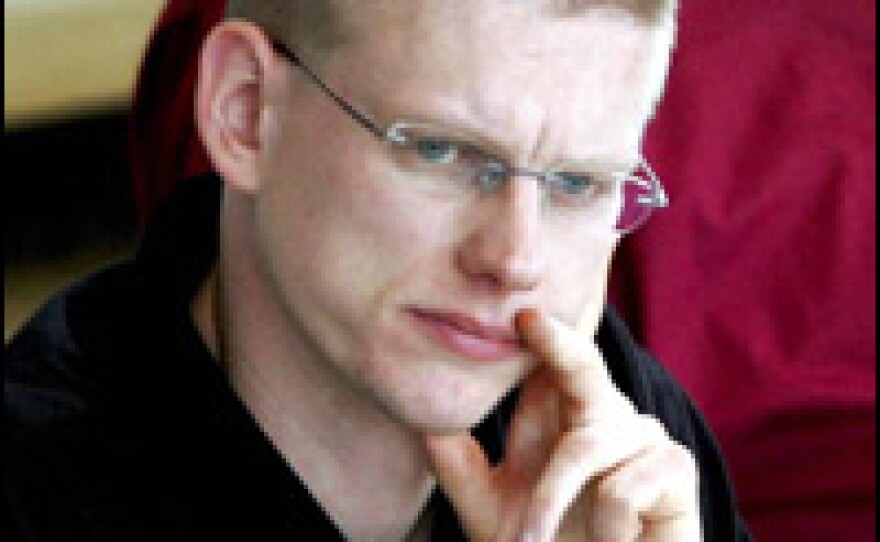


In the days following Barack Obama's historic election as America's 44th — and first black — president, expressions of congratulations and joy have filled the pages of newspapers in Europe. But mixed in with the glad tidings have been inappropriate, insensitive and downright racist remarks from politicians and journalists.
In Germany, Poland, Italy and other countries, statements about Obama's skin color by public figures have caused an international stir.
Who knows if these remarks would have received attention if Obama had not been elected? But he was, and they have.
A New Tradition of Accountability?
"I'm not that surprised by such comments," says Jabari Asim, whose book, What Obama Means: For Our Culture, Our Politics, and Our Future, is to be published in January. Asim says he keeps coming back to something he heard during the election: A political scientist at Stanford University said there are a lot fewer bigots in America than there were 50 years ago, but that doesn't mean there are only a few bigots.
Bigotry, Asim says, abounds the world over. But with Obama's election, "There is going to be a new tradition of accountability in the United States."
And maybe, he adds, that new tradition will fan out to other nations.
Julian Bond, chairman of the NAACP, says, "The big difference here is that the United States has been thinking about and dealing with race since we were founded. These countries in Europe are relative newcomers to the conversation about race. They are much less familiar with confronting their own bigotry."
Until the 20th century, many European countries lacked substantial populations of racial minorities. In recent decades, the influx of immigrants, many from former colonies, has stirred racial tensions on the continent.
Bond adds, "I have always thought that European countries are more bigoted than the U.S."
Comments Heard 'Round The World
In Germany, the Berlin chapter of the American Jewish Committee protested a statement released by Juergen Gansel, a state legislator and member of the extreme-right National Democratic Party. The statement was titled "Africa conquers the White House."
According to AFP news service, Gansel asserted that Obama hopes to destroy America's "white identity" and that multiculturalists in America are trying to destroy other "pure" national identities. A Berlin newspaper referred to the White House as "Uncle Barack's Cabin," playing on the famous 19th century U.S. novel decrying slavery, Uncle Tom's Cabin. The editor told the German press that the headline was satirical.
A recent story in The Washington Post listed examples of international insensitivity: An Austrian journalist said on television that Americans must still be racists to make such a big deal about sending a black couple to the White House. He went on to say that he "wouldn't want the Western world to be directed by a black man." He said, "If you say that is a racist comment, you're right. Without a doubt."
In Poland, a legislator said that the election heralds "the end of the white man's civilization" and that Obama is a "crypto-communist" who would surely prove disastrous for America. He apologized for the assertions.
Italian Prime Minister Silvio Berlusconi said Obama is "young, handsome and even suntanned." He said later he was just joking.
Speaking About Race
In this country, says Asim, "We correct each other. We challenge each other."
Remember Earl Butz, secretary of agriculture under Presidents Nixon and Ford, who told a stupid joke and got fired? Or Cincinnati Reds owner Marge Schott? Or Los Angeles Police Department detective Mark Fuhrman? Each of those people let slip their inner racist and paid the price.
And, as Asim points out, bigotry and insensitivity are still very present in the U.S., even though the country just elected a person of color to its highest office. Just check out the comments about Obama stories on public message boards.
Still, Asim says Obama's election presents an opportunity to show the world how a vibrant and diverse democracy can learn to speak about race freely — and civilly.
The American Promise
Already there are signs of change in Europe in the wake of Obama's election. The first lady of France, Carla Bruni-Sarkozy, has expressed her support for affirmative action-type policies in her country. A French legislator is calling for a greater spectrum of faces on television. European activists have taken the opportunity to point out the dearth of diversity among elected representatives in various countries.
Thomas Kleine-Brockhoff, senior director for policy programs at the German Marshall Fund, is a German native and former U.S. bureau chief for Die Zeit weekly. As part of his job, he deals with people from all over the world.
"One of the big traits of America for Europeans is a universalist aspiration," says Kleine-Brockhoff. "Obama is in the mainstream of that universalist aspect. Anybody can be American — even if you have a Kenyan father." Many European countries do not automatically grant citizenship to the children of immigrants born in the country.
"Obama is the American Dream fulfilled," he says.
During the years of the Bush administration, Kleine-Brockhoff says, "many Europeans saw the U.S. as hypocritical." For example, the U.S. talked about democratic values, but it started a war on false pretenses, he says. And abroad, he says, many blamed racial prejudice for the government's failures in New Orleans.
Obama's victory comes as a surprise to some people from other countries. "They find it hard to believe how far America has progressed in race relations," Kliene-Brockhoff says. "And how Americans have overcome their original sin" of slavery.
With the election of Obama, Kleine-Brockhoff says, Americans have lived up to their promise of liberty, equality and brotherhood. "Other Democratic countries have that promise as well," he adds, "but they haven't made good on it yet."
Material from The Associated Press was used in this report.
Copyright 2022 NPR. To see more, visit https://www.npr.org. 9(MDAzMjM2NDYzMDEyMzc1Njk5NjAxNzY3OQ001))






